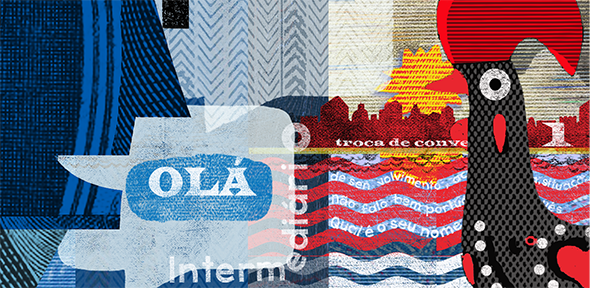
 There are approximately 240 million speakers of Portuguese in the world, which makes it the third most spoken European language after English and Spanish, and the sixth most widely spoken language in the world. The Portuguese language is spoken on four continents in countries in Africa, Asia, Europe and South America, and it is the official language in eight countries: Portugal, Brazil, Mozambique, Angola, Guinea-Bissau, São Tomé and Príncipe, Cape Verde and East Timor.
There are approximately 240 million speakers of Portuguese in the world, which makes it the third most spoken European language after English and Spanish, and the sixth most widely spoken language in the world. The Portuguese language is spoken on four continents in countries in Africa, Asia, Europe and South America, and it is the official language in eight countries: Portugal, Brazil, Mozambique, Angola, Guinea-Bissau, São Tomé and Príncipe, Cape Verde and East Timor.
Despite its regional variations, standard Portuguese is understood by all native speakers and enables non-native speakers to communicate effectively whether in Brazil, Portugal or any other lusophone country.
Throughout the Portuguese Language course at CULP you will be exposed to audios, videos and written texts in both European and Brazilian variants of the language. There will be clarifications related to lexical, grammatical and phonetic differences between variants according to each proficiency level.
If you already have some experience in any of the variants, please note that both Brazilian and European Portuguese will be accepted in spoken and written productions as long as consistency is maintained.
If you are planning to study or work in one of these countries, it is a good idea to start learning Portuguese, because knowing the language will allow you to interact with local people and communicate effectively.
 Although there are some differences in the use of the language due to the variety of places where it is spoken, there has been an Orthographic Agreement (2012) endorsed by the Portuguese speaking countries. The objective of the agreement is to strengthen the role of the Portuguese language internationally and to guarantee linguistic uniformity among the eight member states of the Community of Portuguese Language Countries (CPLP).
Although there are some differences in the use of the language due to the variety of places where it is spoken, there has been an Orthographic Agreement (2012) endorsed by the Portuguese speaking countries. The objective of the agreement is to strengthen the role of the Portuguese language internationally and to guarantee linguistic uniformity among the eight member states of the Community of Portuguese Language Countries (CPLP).
We look forward to seeing you in our lessons, and we hope that you will enjoy learning Portuguese with us.
Até logo!
Qualifications framework level: CEFR A1
Prerequisites
For absolute beginners (ab initio learners) or for those with very little knowledge of the language.
Educational Aims
At the Basic 1 level the main aims are:
- To develop a basic understanding and an appreciation of the salient linguistic features;
- To establish the learner as a fairly confident language user in a range of predictable every-day situations;
- To introduce students to the cultural background of Portuguese Speaking countries, with a main focus on Brazil, within the context of language teaching.
Learning Outcomes
By the end of the Course students will be able to:
| Listening/Speaking | Understand basic instructions or take part in a basic factual conversation on a predictable topic. |
|---|---|
| Reading | Understand a set of basic notices, instructions or information. |
| Writing | Write a brief informal letter or e-mail on an every-day predictable topic. |
Topics
The Course introduces students to the following functions and notions:
- Greetings
- Introducing oneself, friends and family
- Describing your nationality, age and profession
- Talking about your daily life, expressing routines, about hobbies, free time activities, interests and expressing likes and dislikes
- Shopping at the market or shop, inquiring about prices, size, quantity etc
- Describing a dwelling, giving/asking for directions
- Talking about work/study, the timetable, telling the time
- Understanding information relevant to travel, holiday and staying in a hotel
- Talking about the future, discussing plans the next holiday
- Ordering food or drink and paying the bill
- Giving instructions and planning an event.
Syllabus:
Qualifications framework level: CEFR A2
Prerequisites
Level A1 of the CEFR or equivalent. This is a continuation of the Portuguese Basic 1 course, suitable for students who have picked up the basics of the language when travelling or at school.
Educational Aims
At the Basic 2 level the main aims are:
- To establish the learner as a confident language user in a range of predictable everyday situations;
- To further develop the understanding and an appreciation of the relevant linguistic features of the language;
- To enhance students understanding of to the historical and cultural background of Portuguese Speaking countries, with a main focus on Brazil.
Learning Outcomes
By the end of the Course students will be able to:
| Listening/Speaking | Understand basic instructions or take part in a basic factual conversation on a predictable topic. Express opinions on abstract/cultural matters in a limited way or offer advice within a known area, and understand instructions or public announcements. |
|---|---|
| Reading | Understand routine information and articles, and the general meaning of non-routine information within a familiar area. |
| Writing | Write brief letters, e-mails, tweets or make notes on familiar or predictable matters. |
Topics
The Course introduces students to the following functions and notions:
- Talking about current and future events
- Talking about past experiences and how things used to be in the past
- Describing your illnesses and symptoms
- Having a conversation with a doctor
- Talking about hobbies, free time activities, interests and habits
- Talking about preferences and replying invitation
- How to invite people to an event
- Talking about food and traditional dishes
- Talking about Portuguese Speaking countries and your own country
- Discussing traditional celebrations in the Portuguese speaking countries
- Describing cities, places, weather and nature
- Understanding an advertisement about a holiday resort
- Describing what kind of holiday you would like to have
- Shopping at the clothes shop, enquiring about prices, size etc
- Talking about the environment and discussing different lifestyles.
Syllabus:
Qualifications framework level: CEFR B1
Prerequisites
CULP Basic Portuguese / CEFR A2
Educational Aims
At Intermediate 1 level the main aims are:
- To build on a basic understanding and an appreciation of the salient linguistic features;
- To establish the learner as a confident language user in a range of predictable everyday situations;
- To equip the learner with the skills and knowledge to deal with straightforward job applications and interviews;
- To increase students' knowledge of the cultural background of Brazil within the context of language teaching.
Learning Outcomes
By the end of the Course students will be able to:
| Listening/Speaking | Express opinions on abstract/cultural matters in a limited way or offer advice within a known area, and understand instructions or public announcements. |
|---|---|
| Reading | Understand routine information and articles, and the general meaning of non-routine information within a familiar area. |
| Writing | Write letters or make notes on familiar or predictable matters. |
Topics
The Course introduces students to functions and notions such as:
- To be able to describe one's routine, free time and weekends;
- To be able to describe one's work experience including studies/jobs, and writing a mini CV;
- To be able to describe what one used to do before the current work/study situation, one's current responsibilities, and to produce a CV for an interview;
- To be able to identify a suitable job from a website, apply for it and attend a job interview;
- To be able to talk about one's health, request medication and understand instructions given by a doctor or pharmacist;
- To be able to discuss life styles and fitness routines;
- To be able to recount an accident in general and to follow the treatment;
- To be able to recount an incident in detail, describing the setting and elaborate what could have happened in another circumstance;
- To be able to analyse how life used to be in the past and compare it with the present, recounting historic events;
- To be able to comment on one's plans and wishes, and to analyse what one would do in a variety of hypothetical situations.
Syllabus:
Please note that this course is not available in Michaelmas/Lent and will be offered in Easter term 2020.
Qualifications framework level: CEFR B2
Prerequisites
Students who have successfully completed the Intermediate 1 course in the Language Centre, or have acquired a proficiency equivalent to B1 in Portuguese.
Educational Aims
At Intermediate 2 level the main aims are:
- To develop a fairly advanced understanding of the language structure and vocabulary;
- To develop the ability to engage in conversation in Portuguese, where the learner is able to express his or her opinion in a variety of topics;
- To develop in the learner an awareness of the different varieties of Portuguese, when it concerns the lexicon and the phonological systems.
- To develop an awareness of the cultural diversity among Portuguese speaking countries and regions.
Learning Outcomes
By the end of the Course students will be able to:
| Listening/Speaking | Understand spoken Portuguese in a variety of both predictable and unpredictable linguistic situations and be able to express themselves in a variety of situations where a fair amount of detail is necessary. |
|---|---|
| Reading | Understand written Portuguese when texts are intended for native speakers, where visual information is not necessarily available and where the text relies on language structure and lexical refinement to convey specific messages. |
| Writing | Write both formally and informally to a single recipient in a variety of topics, using the appropriate register and formulae to achieve communication. |
Topics
The Course introduces students to functions and notions such as:
- introducing oneself, introducing others, talking about our origin and our mother tongue, explaining why we study Portuguese
- talking about the family, describing our home town and our country, talking about the community where we live, describing our accommodation
- comparing means of transport, describing travel destinations, telling about a travel experience, choosing appropriate accommodation
- describing our profession or topic, describing current activities, describing our previous training
- summarising our work experience, taking a job interview, describing a field of study, describing a work routine
- talking about our spare time and pastimes, talking about our plans
- describing life in the past, understanding the importance of a historical event, talking about historical facts and their relevance, comparing life before and after a historical event
- talking about our plans for the future, talking about what we would do if something happened
- expressing good wishes, describing a personal incident, commenting about something that happened to someone we know, expressing surprise
- describing a pain, asking for a prescription, describing what happened to us, explaining the causes and consequences of an accident, understanding a diagnosis
- following instructions to improve one’s health, explaining what we do to stay in shape, understanding advice to stay in shape, giving advice, analysing causes and effects for being in shape
- understanding alternative medicines in the Portuguese-speaking world, understanding the attitudes towards health
- analysing the characteristics of the Portuguese-speaking world, analysing the recent cultural and social changes
- analysing Brasil culturally, comparing it with Portugal and Angola
- analysing important news about the Portuguese-speaking world, understanding the context of opinions on current topics, debating about topics of local and international relevance
Syllabus:
With effect from August 2022 CULP Advanced level students will be included in the population for the HESA student return. We obtain much of the information required via the annual student registration exercise. CULP students, who are not currently following another course of study, will receive an email inviting them to complete Registration. At the start of the student registration process there is further information about the data collection for statutory purposes and the relevant privacy notices from the University and HESA.
Qualifications framework level: CEFR C1
Prerequisites
CEFR B2 / CULP Intermediate 2
Educational Aims
At Advanced level the main aims are:
- To develop the language skills needed to understand and express complex ideas and opinions in real-time oral/aural situations and to improve the presentation skills in the target language;
- To deepen the knowledge and enhance the appreciation of the cultures of the countries where the language is spoken, as well as of the varieties of the spoken language;
- To equip learners with the necessary knowledge, learning tools and skills that will establish them as independent and successful lifelong language learners.
Learning Outcomes
By the end of the Course students will be able to:
| Listening/Speaking | Contribute effectively to meetings and seminars within own area of work or keep up a casual conversation with a good degree of fluency, coping with abstract expressions. |
|---|---|
| Reading | Contribute effectively to meetings and seminars within own area of work or keep up a casual conversation with a good degree of fluency, coping with abstract expressions. Read quickly enough to cope with an academic course, to read the media for information or to understand non-standard correspondence. |
| Writing | Prepare/draft professional correspondence, take reasonably accurate notes in meetings or write an essay demonstrating the ability to communicate. |
Topics
The Course introduces students to functions and notions such as:
- Talking about the Lusophone countries
- Describing cities and monuments in detail
- Explaining the relevance of a landmark
- Discussing particular characteristics of the Lusophone countries’ traditional celebrations
- Talking about past experiences and how things used to be in the past
- Discussing historical events and their effects
- Talking about languages, culture and linguistic variation
- Discussing the characteristics of the Portuguese language, its similarities and differences in the Lusophone countries/regions.
- Talking about literary texts, their characteristics and relevance
- Talking about Cinema in Portuguese
- Analysing the characteristics and topics of the films in Portuguese language
- Differentiating formal and informal language uses
- Expanding the vocabulary range and expressions to use the language in formal contexts
- Discussing relevant topics of the current affairs in the Lusophone Countries
The Course aims also to empower the learners and establish them as life-long language learners.
Syllabus:
Assessment Framework:


 The Language Centre
The Language Centre
